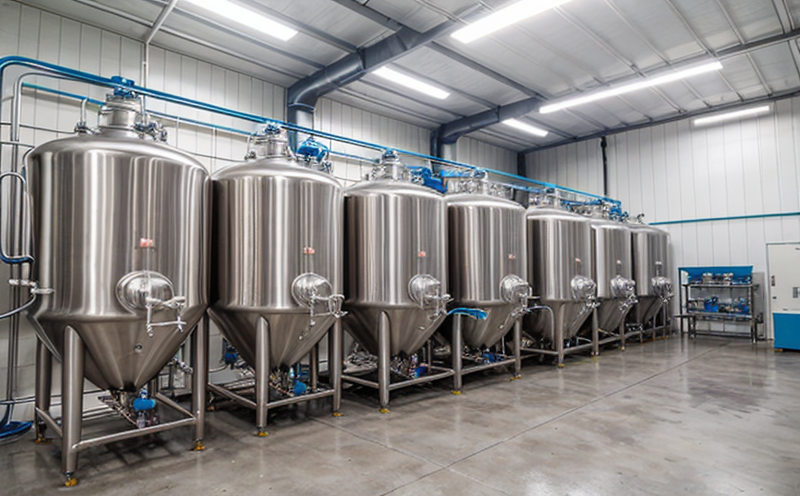ASTM E2694 ATP Bioluminescence Testing in Industrial Fermentation
The ASTM E2694 standard provides a robust framework for assessing the total adenosine triphosphate (ATP) content of biological materials using bioluminescent enzyme technology. This method is particularly valuable in industrial fermentation and biotechnology microbiology, where precise quantification of ATP levels can indicate microbial contamination or metabolic activity.
In the context of industrial fermentation processes, ATP testing serves as a critical quality assurance tool for ensuring product purity and safety. By measuring ATP content, laboratories can detect even low levels of microbial contamination that may compromise the final product's integrity. This is especially important in sectors like pharmaceuticals, food production, and biotech manufacturing.
The test involves collecting samples from fermentation tanks or processing lines, extracting ATP from these samples, and then using a luminometer to measure the light produced by the luciferase-luciferin reaction. The intensity of this light is directly proportional to the amount of ATP present in the sample. This non-destructive method allows for rapid testing without disrupting production processes.
Compliance with ASTM E2694 ensures that laboratories adhere to internationally recognized standards, providing a consistent and reliable approach to microbial monitoring. For quality managers and R&D engineers, this service offers valuable insights into process efficiency and potential contamination risks. ATP testing can also be used in real-time during fermentation processes to optimize conditions and enhance yield.
Furthermore, the test is highly sensitive, capable of detecting minute quantities of ATP down to picomolar levels. This sensitivity makes it ideal for monitoring bioprocesses where even small changes in microbial activity can have significant impacts on product quality. In industrial settings, this translates to improved process control and reduced waste.
For procurement teams, ASTM E2694 ATP testing offers a means of verifying supplier compliance with quality standards. By ensuring that suppliers meet these stringent criteria, organizations can maintain high-quality standards throughout their supply chains.
In summary, ASTM E2694 ATP bioluminescence testing is an essential tool for industrial fermentation and biotechnology microbiology. It provides actionable data on microbial contamination levels, supports process optimization, and ensures compliance with international standards.
Eurolab Advantages
At Eurolab, we pride ourselves on delivering world-class ATP bioluminescence testing services tailored specifically for industrial fermentation processes. Our expertise lies in providing accurate, reliable, and compliant results that meet the highest international standards.
- Innovative Equipment: We utilize state-of-the-art luminometers capable of detecting ATP down to picomolar levels, ensuring precise measurements.
- Experienced Staff: Our team comprises highly trained professionals with extensive experience in microbial testing and industrial biotechnology.
- Comprehensive Reporting: Eurolab offers detailed reports that include test parameters, specimen preparation protocols, and recommendations for process improvements.
- Fast Turnaround Times: We understand the importance of timely results and strive to provide quick turnaround times without compromising on accuracy.
In addition to these advantages, Eurolab's commitment to excellence ensures that our clients receive not only reliable testing but also valuable insights into their fermentation processes. This holistic approach helps organizations make informed decisions regarding quality control and process optimization.
Environmental and Sustainability Contributions
ASTM E2694 ATP bioluminescence testing plays a crucial role in enhancing sustainability practices within industrial fermentation by providing precise measurements of microbial contamination. By identifying even small amounts of contaminants, this method helps reduce waste and energy consumption associated with reprocessing or discarding contaminated batches.
- Minimized Waste: Early detection of contaminants through ATP testing allows for corrective actions to be taken promptly, reducing the need for extensive clean-up operations.
- Energy Efficiency: Optimal process conditions can be maintained by monitoring microbial activity closely. This leads to more efficient use of resources and energy in production processes.
Incorporating ASTM E2694 into industrial fermentation practices contributes positively to environmental sustainability efforts. By minimizing waste, optimizing resource usage, and ensuring product purity, this testing method supports a more sustainable approach to industrial biotechnology.
Competitive Advantage and Market Impact
The implementation of ASTM E2694 ATP bioluminescence testing offers significant competitive advantages in the market by ensuring superior product quality and reliability. In an increasingly demanding regulatory environment, compliance with international standards is essential for maintaining a strong market position.
- Enhanced Product Quality: By detecting microbial contamination early, ASTM E2694 helps maintain high-quality products that meet customer expectations.
- Regulatory Compliance: Adhering to internationally recognized standards enhances the credibility of a company and can open doors to new markets with stringent regulations.
Moreover, the ability to provide rapid and accurate ATP testing results positions Eurolab as a leader in industrial fermentation microbiology services. This competitive edge attracts clients seeking reliable partners for their quality assurance needs, ultimately contributing to market leadership and growth.





